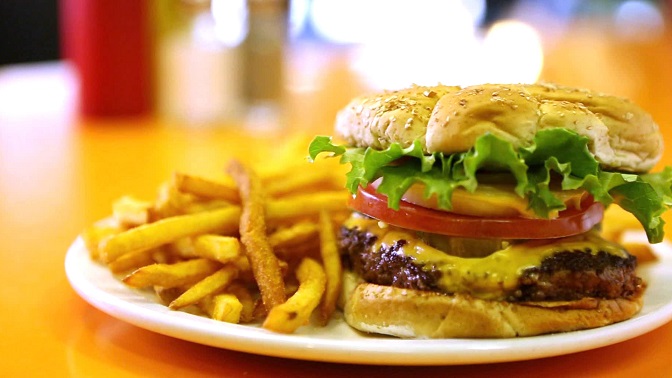The
Holy Spirit and Living a Holy Life
Stephen
Terry
Commentary
for the February 11, 2017 Sabbath School Lesson
 “I have the right to do anything,” you
say—but not everything is beneficial. “I have the right to do anything”—but I
will not be mastered by anything. You say, “Food for the stomach and the
stomach for food, and God will destroy them both.” 1 Corinthians 6:12-13a, NIV
“I have the right to do anything,” you
say—but not everything is beneficial. “I have the right to do anything”—but I
will not be mastered by anything. You say, “Food for the stomach and the
stomach for food, and God will destroy them both.” 1 Corinthians 6:12-13a, NIV
Paul’s words above were written to the Corinthian Church
in the context of a problem of sexual immorality that had arisen there. As
such, he wasn’t really writing about food so much as addressing the problem of
our desires which cause us to lust after things we shouldn’t. This is a problem
we all struggle with, and by that I mean not just church members who are trying
to live holy lives. This is why so many, not just church members, make promises
to recommit themselves to better lifestyle choices each New Year. As a result,
fitness gyms and weight-loss programs see surges in memberships in January of
every year. For those who have been regular members all year long, it can be
trying to have to suddenly wait in lines to use a piece of equipment or to
purchase diet aids. But inevitably, after a month or two has passed, things return
to normal as commitments fade and the regulars are able to return to their
normal routines, working bit by bit to attain their next weight-loss or fitness
goal. They understand that those goals are not reached by making big, rapid
improvements, but by small, sometimes infinitesimal strides that over years add
up to achievements that seem almost god-like to the rest of us.
I understand why people fail to maintain those
commitments. I have been there myself. I have twice lost almost 40 pounds
following a weight-loss regimen. Then each time, after losing so much weight
and feeling the benefits of a lighter step and a healthier body, I have fallen
back into regaining what I had lost. It wasn’t hard to regain. Everything seems
stacked against being healthy. When I look at the weekly grocery store ads, it
is mostly the unhealthy prepared foods that are on sale, the ones that are high
in fats and sugars and low in nutritional value. When watching the television,
the foods that are most often presented are the high-fat burgers and pizzas and
anything else that can be made with lots and lots of cheese. Some ads even tout
that their product is the cheesiest. Why so much emphasis on fats? Perhaps it
is because our taste buds crave it. Fat means flavor. Most backyard barbecue
chefs can tell you that it is the well-marbled steak, with fat evenly distributed
throughout the cut, which is the most flavorful. But lest the vegetarians among
us feel that they are immune from such temptations, one only needs to visit a
vegetarian pot-luck one time to see all the cheeses and rich sauces adorning the
dishes, and should someone bring a cheesecake, all the other desserts would sit
sadly neglected until that high-fat temptation is entirely gone. Even vegans
love their high-fat nuts, avocados and oils. It is no accident that so many
elders and pastors of a certain age will often have what is jokingly referred
to as “Dunlap’s Disease,” where the belly “done lapped over the belt.”
The many temptations to unhealthy eating are clear, but
why do we still struggle when we know that we are digging our graves with our
forks? Let’s face it. If our bodies were not working against us, it would be
easy. We know how delightful a bowl of ice cream will be when each spoonful
hits our tongues. Chocolate seems to create a craving all its own. I have found
that if I have a small piece of chocolate in the afternoon, the very next day,
in the afternoon, I am craving it again. My body feels it is providing something
that it needs in order to function. No doubt many chocoholics are nodding their
heads in agreement at this point. I have found that I have to mentally say, “No!”
to my body in order to get through that next day without indulging the desire
for the chocolate. As it is with the chocolate, I have found it to be throughout
life as well. Once I have tasted chocolate, I doubt my body will ever forget
how it tasted, how enjoyable it was. I may try to replace it with a substitute
like carob, but my body knows the difference, and it does not appreciate the
deception. It seems to appreciate the honesty of the simple “No!” to the insult
and disrespect for its finely honed palate that a carob substitute would imply.
Perhaps this is why so many have a hard time dealing with meat analogs as well.
The bottom line is that the carnal appetite desires, no, demands, carnality. It
will not rest until those desires are fulfilled, and even in the fulfillment,
it craves more. Paul describes this struggle well in his letter to the Roman
Church. Struggle though he might, will to do good though he might, he finds
himself doing the exact opposite over and over again.[i]
So how do we deal with the carnal cravings? How do we
avoid doing what we shouldn’t? Some may say the answer is simply obedience. Do
everything God tells you to do like good little boys and girls and through
perfect obedience you will be holy and salvageable by God’s grace. Don’t obey
and so sad, too bad. Even God’s grace cannot save you from your willful
sinning.[ii] However, while it is true
that sin, any sin, not just willful sin, puts us beyond the pale, we need to
understand that Jesus died for all sins upon the cross. There was not a single
sin that was excluded. God’s grace always remains available even to the willful
sinner. But we can exclude ourselves. Like with those who stop coming to the
gym or to the weight-loss meetings. If we give up and stop attending, it is as
though no gyms, no weight-loss classes even exist. They may not even be found
anywhere on the planet for all the good they would do us once we walked away.
In the same way, we can walk away from God’s grace, and when we do, we make it
as though that sacrifice on the cross no longer exists. Fortunately, even then,
God’s grace pursues us like Francis Thompson’s “Hound of Heaven.”[iii] We may turn entirely away,
placing God and all that pertains to Him behind us, out of sight, yet we still
feel the breath of His grace on the back of our neck, with all of its warmth
and fragrance. Like a persistent knocking at our heart’s door,[iv] His presence continually
seeks to draw our attention even though the desires of our bodies want our
attention elsewhere.
The breakthrough in dieting or exercising comes when we
realize that there is no final goal in this life. Of course we can set goals to
achieve to keep us going in the right direction, but there is no point where we
should say, I have achieved my weight-loss or fitness goal so now I can kick
back and enjoy life. Our bodies will only see this as an opportunity to fulfill
those pent up desires. As a result we end up with the same weight coming off
and going on, over and over again. Instead, we have to realize that the fight
against desire is continuous and will not end except by our death. There is no
attainable perfect obedience that we can reach in these bodies. Perhaps that is
why we must be given better ones one day.[v] However, we can develop a lifestyle
that works by God’s grace and power to deny our carnal desires. We must understand
of course that any small victories we might achieve are not what will save us.
Only the great and final victory of Jesus Christ brings that about. But I believe
God wants us to understand our natures and proclivities and to seek to rise
above them. We can only do that through struggle, for it is in the daily
testing that character is built. He does not expect us to become holy and
righteous in our own right. Otherwise, He could have simply sent the Holy
Spirit to empower us and the cross could have been avoided. We will continue to
stumble and fall throughout life. But He wants us to know that when we do, He
is there to help us up, cleanse us with Jesus’ blood and set us back on our way
toward Him.[vi] As mentioned in the movie
“Bridge of Spies,” starring Tom Hanks, there is a phrase in Russian, cтойкий
мужик, which means “steadfast man.” This is a man
who gets back up no matter how many times he is knocked down. This is the only
perfection that God asks of us, that we be willing to take His hand and get
back up each time we fall. If we do not give up on ourselves, we have nothing
to fear, for the hope of heaven is secured, not by our obedience, but by God’s
grace, which never fails.
